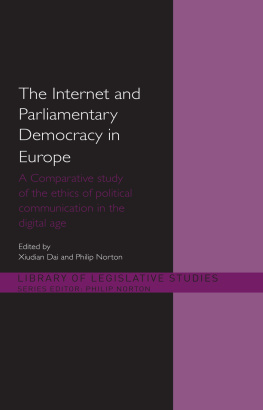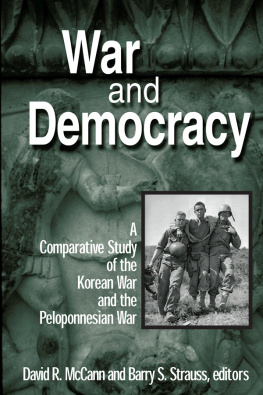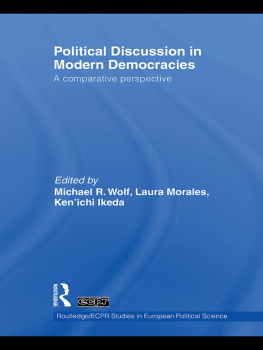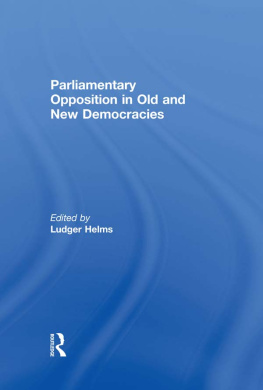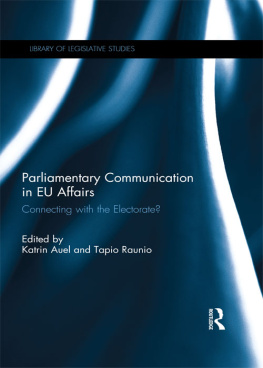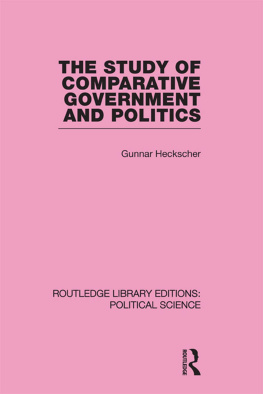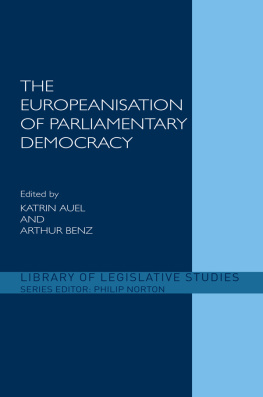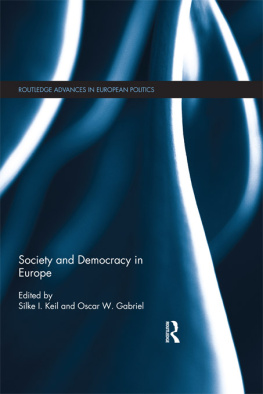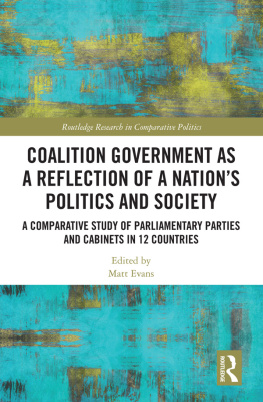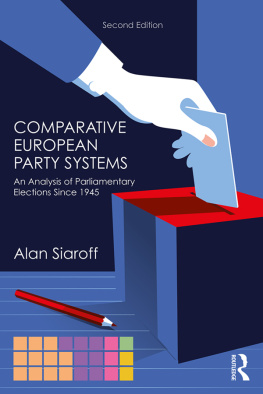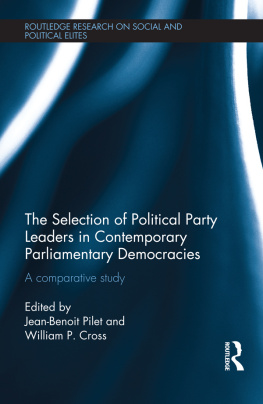The Internet and Parliamentary Democracy in Europe
This book investigates the ethical challenges the internet presents to contemporary parliamentary democracy in Europe and how these challenges are being addressed. It fills an important gap: current literature until now has largely focused on the study of internet usage by politicians and institutions. With the ever widening scope of participation in internet-based communication, there are widely differing views on its potential social, economic and political impact, and whether parliamentary democracy will be strengthened or weakened in the information age. Key questions include:
To what extent is the internet being used in parliamentary political communication?
Should there be any institutional control and monitoring of parliamentarians use of the internet?
What impact does the internet have upon the principle of trust and transparency in the context of parliamentary democracy?
The book compares four European parliaments in Europe: the British, European, Portuguese and Swedish Parliaments, using both quantitative methods (questionnaires and survey of websites) and qualitative methods (workshops and face-to-face interviews with parliamentarians and parliamentary staff).
Xiudian Dai is senior lecturer in politics of the new media in the Department of Politics and International Studies at the University of Hull. Dai has published widely on the politics of new media technologies, including The Digital Revolution and Governance (Ashgate, 2000) and Corporate Strategy, Public Policy and New Technologies (Pergamon, 1996).
Lord Norton of Louth [Philip Norton] is Professor of Government in the Department of Politics and International Studies at the University of Hull. Lord Norton is author or editor of 26 books. He is an internationally recognised expert on the British Parliament and on comparative legislatures.
Library of Legislative Studies
Edited by Lord Philip Norton of Louth, University of Hull, UK.
1. National Parliaments & the European Union
Edited by Philip Norton
2. The New Parliaments of Central & Eastern Europe
Edited by David M.Olson & Philip Norton
3. Members of Parliament in Western Europe
Edited by Wolfgang C. Muller & Thomas Saalfield
4. The New Roles of Parliamentary Committees
Edited by Lawrence D. Longley & Roger H. Davidson
5. Conscience and Parliamant
Edited by Philip Cowley
6. Parliaments & Governments in Western Europe
Edited by Philip Norton
7. Parliaments and Pressure Groups in Western Europe
Edited by Philip Norton
8. Parliaments in Asia
Edited by Philip Norton & Nizam Ahmed
9. The Uneasy Relationship between Parliamentary Members and Leaders
Lawrence D. Longley & Reuven Yair Hazan
10. Delegation and Accountability in European Integration
Edited by Torbjorn Bergman & Erik Damgaard
11. Second Chambers
Edited by Nicholas Baldwin & Donald Shell
12. Parliaments and Citizens in Western Europe
Edited by Philip Norton
13. The Rise of the Norwegian Parliament
Edited by Hilmar Rommetvedt
14. The Unseen Hand
Edited by Rinus van Schendelen & Roger Scully
15. The Scottish Parliaments
Edited by David Arter
16. From Legislation to Legitimation: The Role of the Portuguese Parliament
Edited by Cristina Leston-Bandeira
17. Cohesion & Discipline in Legislature
Edited by Reuven Y. Hazan
18. Southern European Parliaments in Democracy
Cristina Leston-Bandeira
19. Executive Leadership & Legislative Assemblies
Edited by Nicholas Baldwin
20. The Europeanisation of Parliamentary Democracy
Edited by Katrin Auel and Arthur Benz
21. Comparing and Classifying Legislatures
Edited by David Arter
22. The Peoples Congresses and Governance in China: Toward a Network Mode of Governance
Ming Xia
23. Post-Communist and Post-Soviet Parliaments: The Initial Decade
Edited by Philip Norton and David M. Olson
24. The Internet and Parliamentary Democracy in Europe: A Comparative Study of the Ethics of Political Communication in the Digital Age
Edited by Xiudian Dai and Philip Norton
First published 2008 by Routledge
2 Park Square, Milton Park, Abingdon, Oxon, OX14 4RN
Simultaneously published in the USA and Canada
by Routledge
270 Madison Avenue, New York, NY 10016
Routledge is an imprint of the Taylor & Francis Group, an Informa business
2008 Edited by Xiudian Dai and Philip Norton
Typeset by Value Chain, India
Printed and bound in Great Britain by TJI Digital, Padstow, Cornwall
All rights reserved. No part of this book may be reprinted or reproduced or utilised in any form or by any electronic, mechanical, or other means, now known or hereafter invented, including photocopying and recording, or in any information storage or retrieval system, without permission in writing from the publishers.
British Library Cataloguing in Publication Data
A catalogue record for this book is available from the British Library
ISBN 10: 0-415-45948-6
ISBN 13: 978-0-415-45948-8
Xiudian Dai is Senior Lecturer in the politics and political economy of new media technologies, with particular reference to the European Union (EU) and China, at the University of Hull, where he is the coordinator of the e-Parliament research project (www.hull.ac.uk/e-parliament) and director of the postgraduate programme, The Internet and the New Economy. He is currently conducting research on the use of new media technologies by the National Peoples Congress (NPC) and its members in China. Xiudian is the author of The Digital Revolution and Governance (Ashgate, 2000) and Corporate Strategy, Public Policy and New Technologies (Pergamon, 1996).
Cristina Leston-Bandeira is a Lecturer in Legislative Studies at the University of Hull. She has established herself as an expert on the Portuguese Parliament. She currently works on the relationship between parliament and the Internet, being the co-ordinator of a project that brings together academics and parliamentary officials from several European parliaments. Her recent publications include From Legislation to LegitimationThe Role of the Portuguese Parliament, 2004, and Southern European Parliaments in Democracy (editor), 2004.
Magnus Lindh is a Lecturer in Political Science at the Department of Political and Historical Studies, Karlstad University in Sweden. Alongside his research interests in the usage of information and communication technology (ICT) for political purposes, Magnus researches on how regional actors interact with the European Union. He co-ordinates the Regions in a Globalised World

